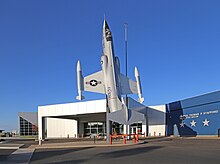The Stafford Air & Space Museum is located in Weatherford, Oklahoma, United States. The museum, named after NASA astronaut and Weatherford native Thomas P. Stafford, became a Smithsonian Affiliate in June 2010.

The museum's displays include Stafford's Apollo 10 spacesuit, the Gemini 6A spacecraft, artifacts from the Space Shuttle program, the Hubble Space Telescope, the Mir Space Station, a Moon rock, a Titan II missile, a Mark 6 re-entry vehicle, and a collection of over 20 historic aircraft.[1][2]
The museum is located at the Thomas P. Stafford Airport.
Name
editThe museum is named for legendary astronaut and flight pioneer Lt. Gen. Thomas P. Stafford, a native of Weatherford and one of only 24 people to have traveled to the Moon. Graduating from the U.S. Naval Academy, Stafford is a recipient of the Congressional Space Medal of Honor. A veteran of four space flights, he piloted Gemini 6A, and commanded Gemini 9A, the 1969 Moon-orbiting mission Apollo 10, and the 1975 Apollo–Soyuz Test Project.[4]
History
editThe museum opened in 1983 in two rooms at the Weatherford airport. By 2006, it had expanded to four buildings.[5]
Exhibits
editThe center boasts one of the few actual Titan II launch vehicles on display. The huge rocket body spans the back of a display gallery from one side of the building to the other. Numerous items acquired from the Smithsonian and on display include: a Gemini flight suit, space food, survival items flown to the Moon on Apollo 11, and the actual flight pressure suit Stafford wore on Apollo 10, the first flight of the Apollo Lunar Module which orbited the Moon.
The hatch through which U.S. astronauts and Russian cosmonauts docked and greeted each other in space during the 1975 Apollo–Soyuz mission is on display in the museum. Stafford is pictured reaching through the hatch, shaking hands with Russian cosmonaut Alexei Leonov. The actual uniforms that the two astronauts were wearing at the time are also on display.
Other exhibits include retired aircraft, such as a Russian MiG-21R and a F-16. Full-size replicas displayed include the Wright Flyer, Spirit of St. Louis, Apollo Command Module, and Gemini spacecraft. The museum also features the Rose & Tom Luczo Educational Center, which includes a flight simulation computer lab, a kids' library, and a Talon A3 Motion-Based Flight Simulator that runs X-Plane 11 and Microsoft Flight Simulator X. Also on display is a TP-82 Cosmonaut survival pistol given to Stafford by Leonov.
As of March 5, 2018, the museum has acquired a Fairchild Republic A-10 Thunderbolt II, also known as the "Warthog," which is on display outside the museum. In July 2018, the Gemini 6A spacecraft was moved to the museum.[6][2]
Early aviation
edit- Wright Flyer (full-scale, flyable replica)
- Blériot XI (full-scale replica)
- Curtiss Pusher (full-scale, flyable replica)
- Sopwith Pup (full-scale replica)
- Spirit of St. Louis (full-scale replica)
Early rocketry
edit- Goddard rocket (full-scale replica)
- V-2 rocket engine (actual artifact)
- Sputnik 1 (full-scale replica)
- Explorer 1 (full-scale replica)
Mercury, Gemini, and Apollo programs
edit- Lunar Sample collected by Gene Cernan on Apollo 17 (actual artifact)
- Congressional Space Medal of Honor presented to Thomas P. Stafford in 1993 (actual artifact)
- Gemini 6A spacecraft[2] (actual artifact)
- Gen. Stafford's Gemini space suit (actual artifact)
- Apollo 10 space suit (actual flown artifact)
- Lunar Module Checklist (actual flown artifact)
- Apollo–Soyuz Docking Ring (actual artifact)
- Mission Control console from Johnson Space Center (actual used artifact)
- F-1 rocket engine (actual artifact)
- J-2 rocket engine (actual artifact)
- Titan II rocket (actual, flight-ready artifact)
- 1/2 scale Lunar Module
- Apollo Command and Service Module (full-scale replica)
- Gemini spacecraft (full-scale replica)
- 1/72 scale models of all of the man-rated rockets of the "Space Race"
- Astronaut Maneuvering Unit model
Modern space and aviation
edit- Space Shuttle main engine (actual flown artifact)
- Shuttle solid rocket booster segment (actual flown artifact)
- Mark 6 nuclear warhead (actual, but disarmed, artifact)
- 1/15th scale Hubble Space Telescope
- Rocket "Crawler Shoe" (actual artifact)
- Bell X-1 (full-scale replica)
- F-86 "Sabre" fighter (actual artifact)
- MiG-21R "Fishbed" fighter (actual artifact)
- T-38 "Talon" trainer (actual artifact)
- T-33 trainer (actual artifact)
- B61 thermonuclear bomb (actual, but disarmed, artifact)
- F-16 "Fighting Falcon" (actual artifact)
- F-104 "Starfighter" (actual artifact)
- F-4 Phantom (actual artifact)
- A-10 Thunderbolt II "Warthog" (actual artifact)[7]
References
edit- ^ "EXHIBITS". Stafford Air & Space Museum. Retrieved 2016-12-23.
- ^ a b c Pearlman, Robert (July 31, 2018). "Museum Move Reunites Historic Gemini 6 Spacecraft with its Pilot". Space.com. Retrieved July 31, 2018.
- ^ "Home". Stafford Air & Space Museum. Retrieved 2018-03-06.
- ^ "Stafford Air & Space Museum". www.travelok.com. Retrieved 2010-06-13.
- ^ Clark, Keli (18 June 2006). "Oklahoma Aircraft Museum Expands". The Oklahoman. Retrieved 31 December 2023.
- ^ KFOR news
- ^ "EXHIBITS". Stafford Air & Space Museum. Retrieved 2018-03-06.
External links
edit- Museum website
- Stafford Air & Space Museum info, photos and videos on TravelOK.com Official travel and tourism website for the State of Oklahoma